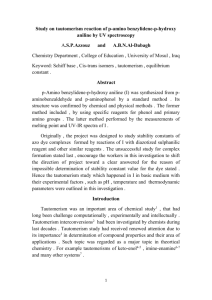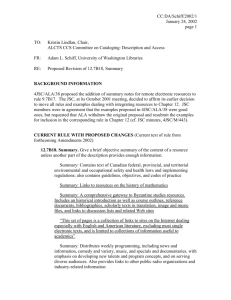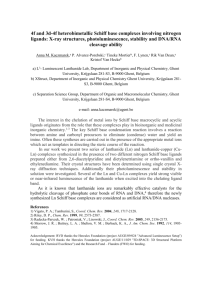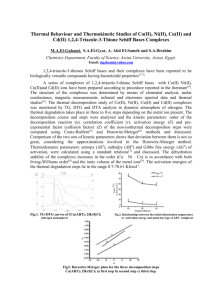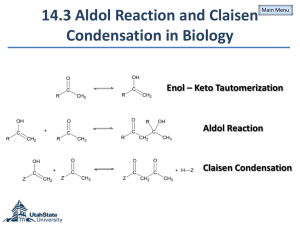The Influence of pH and Temperature on Tautomerism Reactions of
advertisement
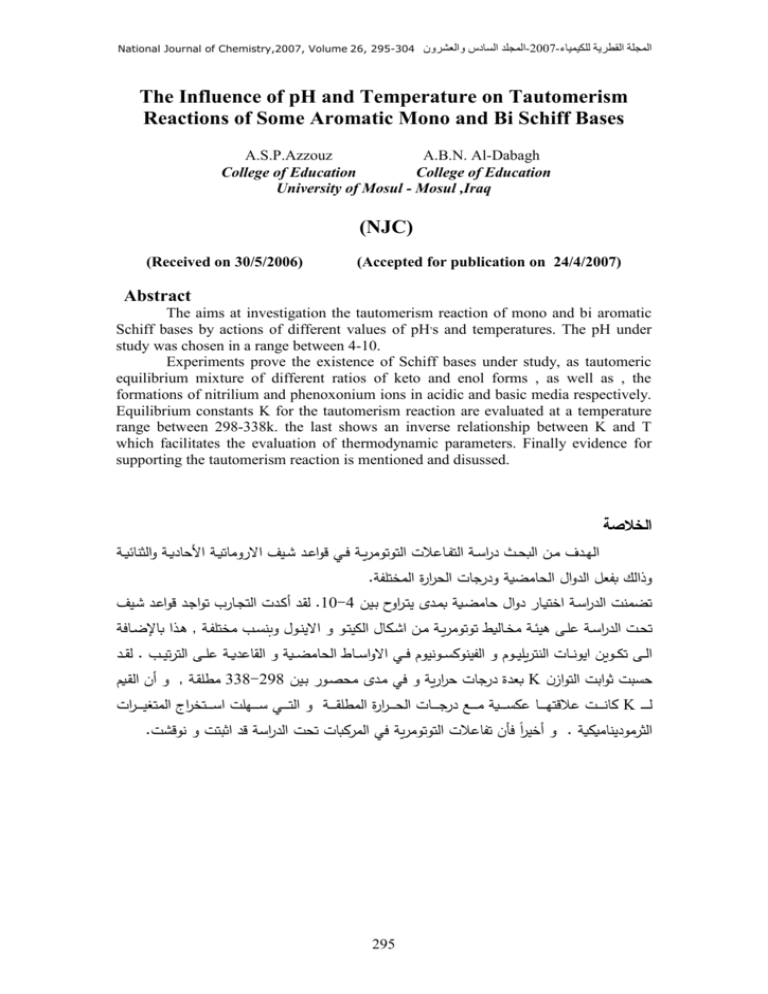
National Journal of Chemistry,2007, Volume 26, 295-304 المجلد السادس والعشرون-2007-المجلة القطرية للكيمياء The Influence of pH and Temperature on Tautomerism Reactions of Some Aromatic Mono and Bi Schiff Bases A.S.P.Azzouz A.B.N. Al-Dabagh College of Education College of Education University of Mosul - Mosul ,Iraq (NJC) (Received on 30/5/2006) (Accepted for publication on 24/4/2007) Abstract The aims at investigation the tautomerism reaction of mono and bi aromatic Schiff bases by actions of different values of pH,s and temperatures. The pH under study was chosen in a range between 4-10. Experiments prove the existence of Schiff bases under study, as tautomeric equilibrium mixture of different ratios of keto and enol forms , as well as , the formations of nitrilium and phenoxonium ions in acidic and basic media respectively. Equilibrium constants K for the tautomerism reaction are evaluated at a temperature range between 298-338k. the last shows an inverse relationship between K and T which facilitates the evaluation of thermodynamic parameters. Finally evidence for supporting the tautomerism reaction is mentioned and disussed. الخالصة اله د م ددب الدرددة الفددال اللتددومري الل ل لدددال ددر م ام د حددية اال ول ددال ا رو ددال ال و دال .لجوي الر اللة ال خللتال لقد كدد ي اللجدولو ل اجد م امد حدية.10-4 ديب ااي د ل ة فددو خللتددال خددذا دوإلضددو ال لق د. القوم ددال مل د الللليددو كب القد .محي لض ي ال الفدال اخل دول ال رو ضد ال د د ر يلد ال لرددي ال الفددال ملد خي ددال خددول ط ل ل لدددال ددب احددكول الديلد ددر اا افددوط الرو ض د ال طلقدال338-298 ر د ر رود ل ديب الل د ددر فد د ددهلي اف د ددلخ ال ال ل يد د دلاي ذالك دتعل ال ال الرو ض ال التي كف د ي ال د لد د دب اي ددوي ال للدلي د دع ة لجوي ر اللدالK رف ي ا ي الل ازب لجد د ددوي الرد د د اللة ال طلقد د ددال كو د د ددي مرمله د ددو مكف د د د ال د د دK ل د د د كخي اًل أب لتومري الل ل لدال ر ال لكدوي لري ال لافال م ا لي 295 . ال ل ي و ك ال National Journal of Chemistry,2007, Volume 26, 295-304 Introduction The concept of tautomerism of carbonyl1,2 , analide3 and Schiff base4 had been extensively studied. The enolization reaction is probably the most discussed type of prototropic tautomerism. The method 1 used for the determination of keto enol equilibrium constants can be classified as chemical and physical , particularly spectroscopic method. In 2004 a new 5 spectrophotometric method had been developed for the determination of trace amounts of Schiff base benzylidene o-hydoxyaniline via coupling with suphanilic acid salt at pH 7. A few publications1 concerning the tautomerism of carbonyl compounds in the gas phase are observed in literature. This is due to experimental difficulties. The last encourage Azzouz6 to deal with tautomerism and thermodynamic study of deoxybenzoin and some related compounds by using the integrated ion current (IIC) curve by mass spectrometry. Recently , and in our laborotary we have synthesized7 some Schiff bases derived from salicyladehyde and o-methoxy benzaldehyde with an appropriate primary amines, forming mono and bi base linkages. A prelimenary UV and IR spectral study on these Schiff bases revealed their tautomeric existence in 1,2-dichloro ethane solvent. As a continuation for the last work , this paper describes the influence of pH and temperature on tautomerism reactions of Schiff bases mentioned. Experimental All chemicals used throughoul this work , the synthesis of Schiff bases and their characterization by melting points , UV and IR spectra have been mentioned7. المجلد السادس والعشرون-2007-المجلة القطرية للكيمياء Apparatus: All UV absorption measurements were made by using pye Unicam sp 8000 spectrophotometer using a matched silica cell. It is connected to julabo paratherm pt 40 ps water thermostat. A fixed temperature is obtained through cell compartment by water circulation. Results and discussion This investigation deals with studying the experimental factors Affecting the tautomerism reactions in Schiff bases under study , namely the pH and temperature. Table (1) show the nomenclatures , structures and melting points of all mono and bi Schiff bases linkages used in this work. The following division of results are thought to be necessary :I. Influence of pH on tautomerism reaction. It is confirmed from UV and IR spectra in our pervious study7 that Schiff bases(1,4-6) are able to from a double folds intramolecular hydrogen bondings of the type O-H∙∙∙N alone or a mixture of O-H∙∙∙N and N-H∙∙∙N. In the meantime Schiff bases 2 and 3 can from the mono intramolecular hydrogen bonding of the type O-H∙∙∙N. These bondings can give additional stabilities8-10 to such Schiff bases or they are kinetically stable or don't susceptible by hydrolysis11 cleavage in water- ethanol mixture as known11 on Schiff basess , especially the aliphatic ones. This encourage the workers to study the influence of pH in arrange 4-10 on tautomerism reactions in Schiff bases summarized as follow :1. salicylidene –o-aminoanilin (1). This compound show three bands in its UV spectra at pH range 4-5. They attributed to nitrilum12 ion at such acidic range , the keto and enol forms respectively. The wavelengths of these bands are in order of nitrilium ion >keto > enol. At pH 6-7, the nitrilium 296 National Journal of Chemistry,2007, Volume 26, 295-304 band is completely disappeared. Finally , when the pH is raised to a range 8-10 , also other three bands are generated. They are assigned to the formation12 of phenoxide ion , the keto and enol forms. 2. salicylidene m-amioanline At pH range 4-7 a three UV bands are also observed. They are reffered to the keto form , the nilrium ion and the enol form and in order of increasing wavelenghths. The intensity of nitrilium ion band is founded to be decreased by elevation of pH. This observation is used here as a confirmation method for assigning the nitrilium ion band.At pH range between 8-10 , only two bands are observed for the keto and enol forms only. 3. salicylidene-p-aminoaniline(3). This compounds shows only one band in its UV spectra at acidic range as assigned to enol form only. The tautomerism reaction are started at pH range 7-10 and resulted to the formation of enol and keto forms , at shorter and longer wavelengths respectively. المجلد السادس والعشرون-2007-المجلة القطرية للكيمياء Disalicylidene –o-aminoanline.(4) At pH range between 4-7 , it shows one UV band , with wavelength directly proportional to the pH of the medium as assigned to enol tautomer. Elevation of pH in a range 8-10 , resulted to the appearance of two UV bands as assigned to keto and enol forms. 5. Disalicylidene –m-aminoaniline (5). This molecule shows one UV band at pH range 4-9. The wavelength of the band is increased by increasing pH and assigned to enol form only. Similarly , at pH 10, the molecule shows two UV bands for keto and enol forms. 6. Disalicylidene –p-aminoaniline (6). At pH range 4-8 the comound shows one UV band for the enol form. The wavelength of the band is directly proportional to pH. An exclusion to the last case is observed at pH 6 and resulted to the formation of two bands as assigned nitrilium ion and enol forms. When the pH is raised 9-10, the compound shows two UV bands for enol and keto forms at lower and longer wavelengths respectively. 4. 297 National Journal of Chemistry,2007, Volume 26, 295-304 المجلد السادس والعشرون-2007-المجلة القطرية للكيمياء Tabel (1) Nomenclatures structures and melting points of imines No. Nomenclature Structure 1 Salicylidene-oaminoaniline CH N 2 3 OH Melting point (C) 62-63 H2N CH N Salicylidene-maminoaniline 84-85 OH Salicylidene-paminoaniline NH2 CH N NH2 199-200 OH CH N 4 Disalicylidene-oaminoaniline OH 165-166 N CH HO CH N 5 Disalicylidene-maminoaniline OH 208-209 N CH HO 6 Disalicylidene-paminoaniline CH N N OH 7 8 oMethoxybenzylideneo-aminoaniline oMethoxybenzylidenep-aminoaniline CH 218-219 HO CH N OCH3 CH N OCH3 298 90-92 H2N NH2 105-107 National Journal of Chemistry,2007, Volume 26, 295-304 II. Influence of temperature. Surely , the temperature as known has a great influence on many chemical reactions , as tautomerism6, formation of hydrogen bonds13-15 pKa of benzaldoxime and other17. المجلد السادس والعشرون-2007-المجلة القطرية للكيمياء required the evaluation of thermodynamic parameters , namely ∆G,∆H and ∆S.The last required the evaluation of equilibrium constant for the reaction outlined above from the relation K=Aketo/Aenol ,where Aketo and Aenol are absorbances of keto and enol respectively.The thermodynamic parameters of tautomerism are evaluated from standard equations(1-3) of forms :- The thermodynamic of tautomerism represents the various energies forms associated with enol keto reversible reaction. These ∆G=-RT lnK …(1) H lnK=const. …(2) RT ∆G=∆H-T∆S …(3) negative sign of G can be interpreted by the greater stability of keto tautomers and the ease of tautomerism process. The enthalpy of H tautomerism process as calculated from equation (2) by plotting lnK versus T-1 with typical plot shown in Fig (1) for the disalicylidene –oaminoaniline in 1,2-DCE and ethanol solvents. All average H values calculated have a negative signs which means that the tautomerism reaction are exothermic. An exception to that is Schiff (6) which gives a positive H values in 1,2-DCE and ethanol. These abnormalities can be interpreted by assuming two processes happening in a consecutive steps. The first is the deassociation of Schiff base (6) to its monomer which required an absorption of heat H 1 to overcome on hydrogen bondings between reactants stated previously as a main step. The second minor step is the tautomersim reaction which is accompanied evolution of heat - H 2 . when H 1 > H 2 so , net H = H 1 - H 2 evaluated has a positive sign. This agrees with experimental findings. Also ∆S are calculated for the tautomerism process in Schiff bases at five different temperatures. These ∆S Tables (2) and (3) show the equilibrium constants thermodynamic parameters calculated for the tautomerism reactions of Schiff bases at different temperatures and in 1,2dichloroethane (1,2-DCE) and ethanol respectively. The plot of lnK versus the inverse of absolute temperature show a straight lines with correlation coefficients range 0.995792-0.999151 and standard error of estimation range 0.005376-0.009947 as evident from statagraph computer programme. A typical plots for the last are show in Fig. (1) for the tautomerism reaction in disalicylidene -o-aminoaniline in solvents 1,2DCE and ethanol.. Tables (2-3) show the thermodynamic parameters calculated and clearly indicate that the sign of ∆G are varied i.e plus or minus or depending on the structure or stability of Schiff base tautomer and the temperature and are highly expected. The positive sign of G as in Tables (2-3) means the nonspontaneous conversion of enol tautomer to keto tautomer. In other words greater stability of enol in Schiff bases compared to their keto forms , possibly by their strong hydrogen bonding ability with solvents mentioned. On the contrary to that the 299 National Journal of Chemistry,2007, Volume 26, 295-304 المجلد السادس والعشرون-2007-المجلة القطرية للكيمياء obtain a negative signs ∆S values for the tautomerism reactions founded here in the first five Schiff bases as in Tabels (2-3). This can happen by either the greater hydrogen bonding or the greater solute – solvent interactions of keto tautomers as compared with enols. values for any Schiff base are very close to each other. This means the non dependence of ∆S at a narrow temperature range between (298328)k. Actually ∆S=S2-S1 , where S2 and S1 are entropies of keto and enol forms respectively. Mostly as founded here S1 Should have greater value than S2. Therefore it is not astonishing to Fig.1 The relationship between lnK versus 1/T for disalicylidene o-aminoaniline in solvents : a- 1,2-DCE b- Ethanol 300 National Journal of Chemistry,2007, Volume 26, 295-304 No. 1 2 3 4 5 6 المجلد السادس والعشرون-2007-المجلة القطرية للكيمياء Table (2) Thermodynamic parameters and equilibrium constants of tautomerism reactions in Schiff bases in 1,2-DCE ∆G ∆S G H Temp.(C˚) lnK -1 J.mole-1 J.mole-1 K-1 J.mole J.mole-1 25 0.2350 -582.2 -409.6 35 0.0149 -38.2 -398.1 -122649.5 -5.7 45 0.0300 -79.3 -385.4 55 -0.070 190.9 -374.5 65 -0.171 480.5 -364.3 25 -0.575 1424.6 -10.6 35 -0.600 1536.4 -10.6 -1729.3 1637.8 45 -0.618 1633.9 -10.6 55 -0.638 1739.8 -10.6 65 -0.660 1854.6 -10.6 25 -1.304 3230.7 -21.9 35 -1.340 3431.3 -21.9 -3300.7 3658.8 45 -1.378 3643.2 -21.8 55 -1.425 3885.9 -21.9 65 -1.460 4102.9 -21.9 25 -0.078 193.3 -3.0 35 -0.087 222.8 -3.0 -698.0 253.1 45 -0.096 253.8 -3.0 55 -0.103 280.9 -3.0 65 -0.112 314.7 -3.0 25 -0.138 341.9 -14.8 35 -0.176 450.7 -14.6 -4060.0 622.6 45 -0.235 621.3 -14.7 55 -0.285 777.2 -14.7 65 -0.328 921.7 -14.7 25 -0.050 123.87 -356.9 35 -0.014 35.8 -345.0 106228.0 -88.7 45 0.040 -105.8 -333.7 55 0.030 -81.8 -323.6 65 0.148 -415.9 -313.1 301 S J.mole-1 K-1 -385.7 -10.6 -21.9 -3.0 -14.7 -334.3 National Journal of Chemistry,2007, Volume 26, 295-304 No. 1 2 3 4 5 6 المجلد السادس والعشرون-2007-المجلة القطرية للكيمياء Table (3) Thermodynamic parameters and equilibrium constants of tautomerism reactions in Schiff bases in ethanol ∆G ∆S G H Temp.(C˚) lnK -1 J.mole J.mole-1 K-1 J.mole-1 J.mole-1 25 -0.730 1808.6 -13.5 35 -0.750 1920.5 -13.4 -2219.8 2067.6 45 -0.780 2062.2 -13.5 55 -0.807 2200.6 -13.5 65 -0.835 2346.4 -13.5 25 -0.020 1424.6 -26.4 35 -0.085 1536.4 -25.9 -6446.5 1632.5 45 -0.180 1633.9 -25.4 55 -0.240 1713.2 -24.9 65 -0.330 1854.6 -24.6 25 -0.440 1090.1 -35.5 35 -0.560 1433.9 -35.5 -9500.0 1795.1 45 -0.670 1771.3 -35.4 55 -0.795 2167.9 -35.6 65 -0.894 2512.2 -35.5 25 -0.243 602.1 -11.5 35 -0.268 686.3 -11.4 -2818.4 814.1 45 -0.300 793.2 -11.4 55 -0.343 935.4 -11.4 65 -0.375 1053.8 -11.5 25 0.400 -991.0 -13.2 35 0.350 -896.3 -13.1 -4921.9 -737.3 45 0.278 -735.0 -13.2 55 0.212 -578.2 -13.2 65 0.173 -486.2 -13.1 25 -0.820 2031.6 -12.7 35 -0.810 2074.2 -12.4 1745.9 2048.1 45 -0.750 1982.9 -11.7 55 -0.760 2072.5 -11.6 65 -0.740 2079.5 -11.3 302 S J.mole-1 K-1 -13.5 -25.4 -35.5 -11.4 -13.2 -11.9 National Journal of Chemistry,2007, Volume 26, 295-304 المجلد السادس والعشرون-2007-المجلة القطرية للكيمياء same enol tautomers. The wavelengths of keto and enol tautomers are very sensitive to the pH of the medium. 5. A direct relationships are observed between lnk versus T-1 for Schiff bases (1-5)with exclusion of Schiff bases (6) and in 1,2-DCE and ethanol solvents. 6. The thermodynamic parameters namely the G , H and S calculated confirm that the tautomerism reactions in Schiff bases are exothermic H =mainly nonspontaneous (∆G=+) and are accompanied by an increase of order of keto tautomers ( S =-) as compared with enol. Conclusions 1. The occurrence of Schiff bases (16) as mono and bi folds intramolecular hydrogen bondings , which gives an additional stability to the molecules. 2. The stability of the molecules stated above facilitate the study of influence of pH in a range between 4-7 on tautomerism process in Schiff bases by aid of UV spectra. 3. A nitrilium ion is observed with some Schiff bases at a pH range 47 with enol and keto tautomers. Other Schiff bases show the enol tautomer at moderate acidic pH as well the keto tautomer and the phenoxide ion at higher basic pH. 4. Generally the keto tautomers in Schiff bases absorb UV at longer wavelengths when compared to the 303 National Journal of Chemistry,2007, Volume 26, 295-304 المجلد السادس والعشرون-2007-المجلة القطرية للكيمياء 10. J.Charett , G.Fathansl and P.Teyssie , Spectrochem. Acta, 1964 , 20 , 597 . 11. Ed.S.Patai, The Chemistry of Carbon Nitrogen Double Bond , 1979 , John Wiley and Sons , New York . 12. M.S.Masoud , G.B.Mohammad , A.M.Hindawey and T.M.AbdelFattah , Mutah J. For Res. and Stud. 1991 , 6,2. 13. G.C.Pimental and A .L.Mecellellan , The Hydrogen Bond 1960 , New York. 14. S.K. Al-Dilami and A.S.Azzouz and N.G.Ahmad , Mutah J. For Res. and Stud. 1990 ,7 , 209. 15. A.S.P.Azzouz and M.M.Al-Niemi , Z.Phys.Chem. 2005 ,1 ,20. 16. A.S.P.Azzouz and N.N.Al-Azzawi , J.Edu. Sci. , 2002 , 1 , 20. 17. A.R.Butler, Problems in Physical Organic Chemistry , 1972 , Wiley, London. References 1. Ed.J.Zabicky, The Chemistry of Carbonyl Group , vol.2 , 1970 , Interscience, London , pp.157-240. 2. G.Allen and R.A.Dwek, J.Chem. Soc., 1966 , 161. 3. G.O. Dudek and E.P.Dudek , J.Amer.Chem.Soc. 1966 , 88 , 2407. 4. G.O. Dudek and E.P.Dudek , J.Amer.Chem.Soc. 1964 , 86 , 2483. 5. A.S.P.Azzouz and I.Z.Sulyman. J.Edu.Sci. 2004 , 16 , 125. 6. A.S.P.Azzouz , Mutah J. For Res. and Stud. 1993 , 8 ,93. 7. A.B.N. Al-Dabagh , M.Sc Thesis , 1999 , Mosul , University. 8. W.Bruyneel , J.J.Charett and E.D.Hoffmann , J.Amer.Chem.Soc. 1966 , 88 , 3808. 9. P.Teyssie and J.J. Charett , Spectrochem. Acta, 1963 , 19 , 1407. 304
